The case against three al-Jazeera journalists on trial in Egypt was undermined in court on Thursday when the prosecution’s three lead witnesses and a lead police investigator appeared to contradict the incriminating claims they made in written testimony.
The al-Jazeera English journalists, Mohamed Fahmy, Peter Greste and Baher Mohamed, were convicted last year of broadcasting false news that harmed Egypt’s national security, based in part on specially commissioned reports from a trio of technicians from Egyptian state television.
Lawyers appealed against the conviction in January, and at a session of the journalists’ retrial on Thursday each of the three technicians admitted that they were not qualified to judge whether key video evidence harmed the stability of the state, nor whether it contained false information, or even if it was broadcast in the first place.
In a typical exchange under cross-examination, defence lawyers asked Kamal Mohamed Kamal: “Does the nature of your work make you intellectually capable of addressing whether the videos harmed national security?”
Kamal replied: “My work just gives me the ability to watch the videos and say whether it contains a montage or not.”
When it was pointed out that he had signed a report that had made grander claims, Kamal, like both of his colleagues, distanced himself from its contents. “I didn’t write that,” he said.
The admission was seized on by defence lawyers, who suggested that each of the technicians’ reports had been faked. Fahmy’s lawyer, Khaled Abu Bakr, told the court: “The testimony for the three prosecution witnesses were identical, to the letter. There’s not even one different letter in the three testimonies.”
The lead police investigator, Ahmed Ayoub, also struggled under cross-examination. He said he based his work on “secret sources who I cannot reveal”, and rowed back on claims made in his written statements that the journalists had imported their cameras illegally.
Most problematically for his case, Ayoub admitted that he did not know whether al-Jazeera English was banned from working in Egypt at the time of its journalists’ arrest.
“It’s not my job to know if it’s allowed to work or not,” Ayoub said, to the delight of the defence.
“This is the case,” shouted Abu Bakr.
The court was adjourned until 25 March, to allow time for a new technical committee to be assembled to determine when the video evidence was filmed, whether it was ever broadcast, and whether it did contain false information that harmed national security.
Following the session, Fahmy and Mohamed told reporters that they took heart from the day’s events. “Today was a big success,” said Mohamed. “They said they didn’t write the statement. So who wrote the statement? It’s a big question mark for us.”
Fahmy added: “Today the lead investigator, the guy who was the reason why we were in the cage, has again refused to respond to questions that are crucial to this case. The man has no answers.”
Fahmy and Mohamed are currently released on bail, after their 13-month custody finally ended at the start of the retrial in February.
Greste was deported to Australia a fortnight earlier, and there were initial hopes that Fahmy, a Canadian-Egyptian citizen, would be sent to Canada using a similar legal mechanism. But though he gave up his Egyptian citizenship to expedite the process, Fahmy’s deportation never happened, and he currently has neither Egyptian nationality nor a valid Canadian passport.
Additional reporting: Manu Abdo
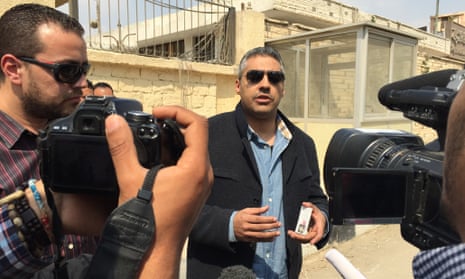

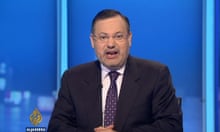
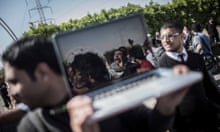

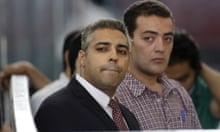
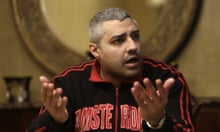
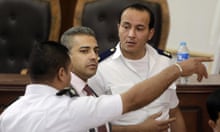
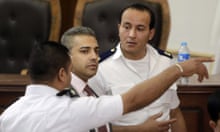
Comments (…)
Sign in or create your Guardian account to join the discussion